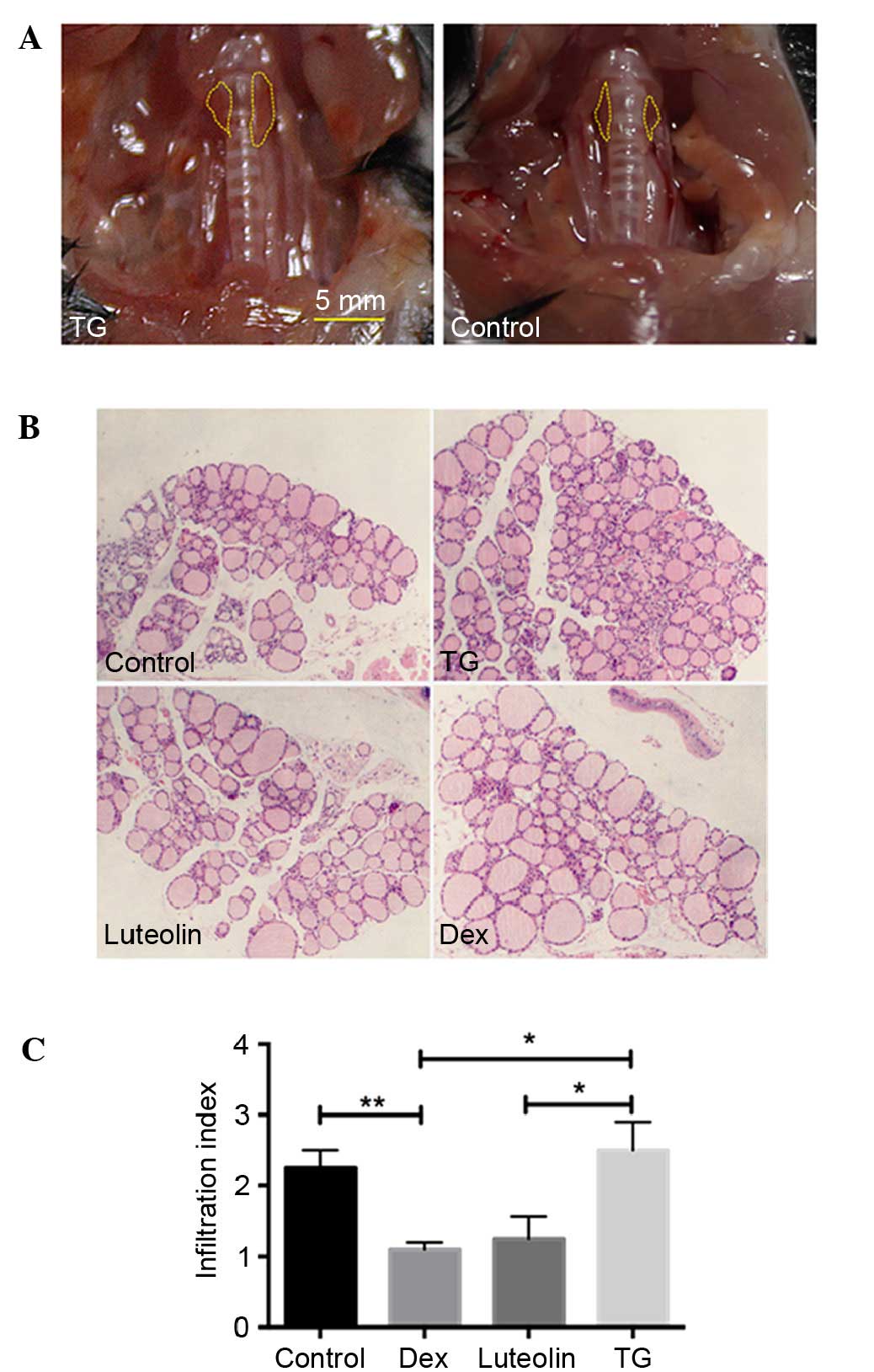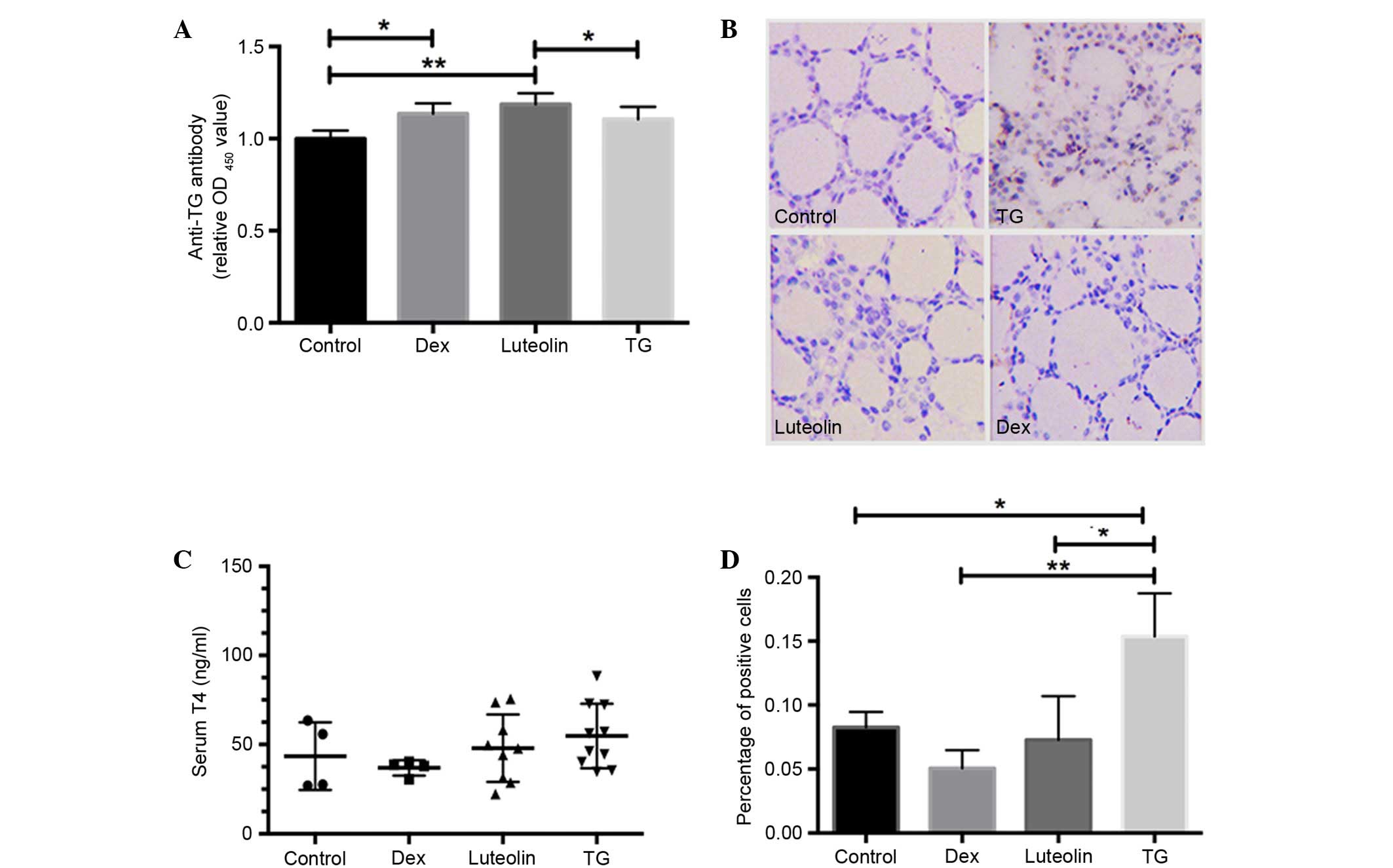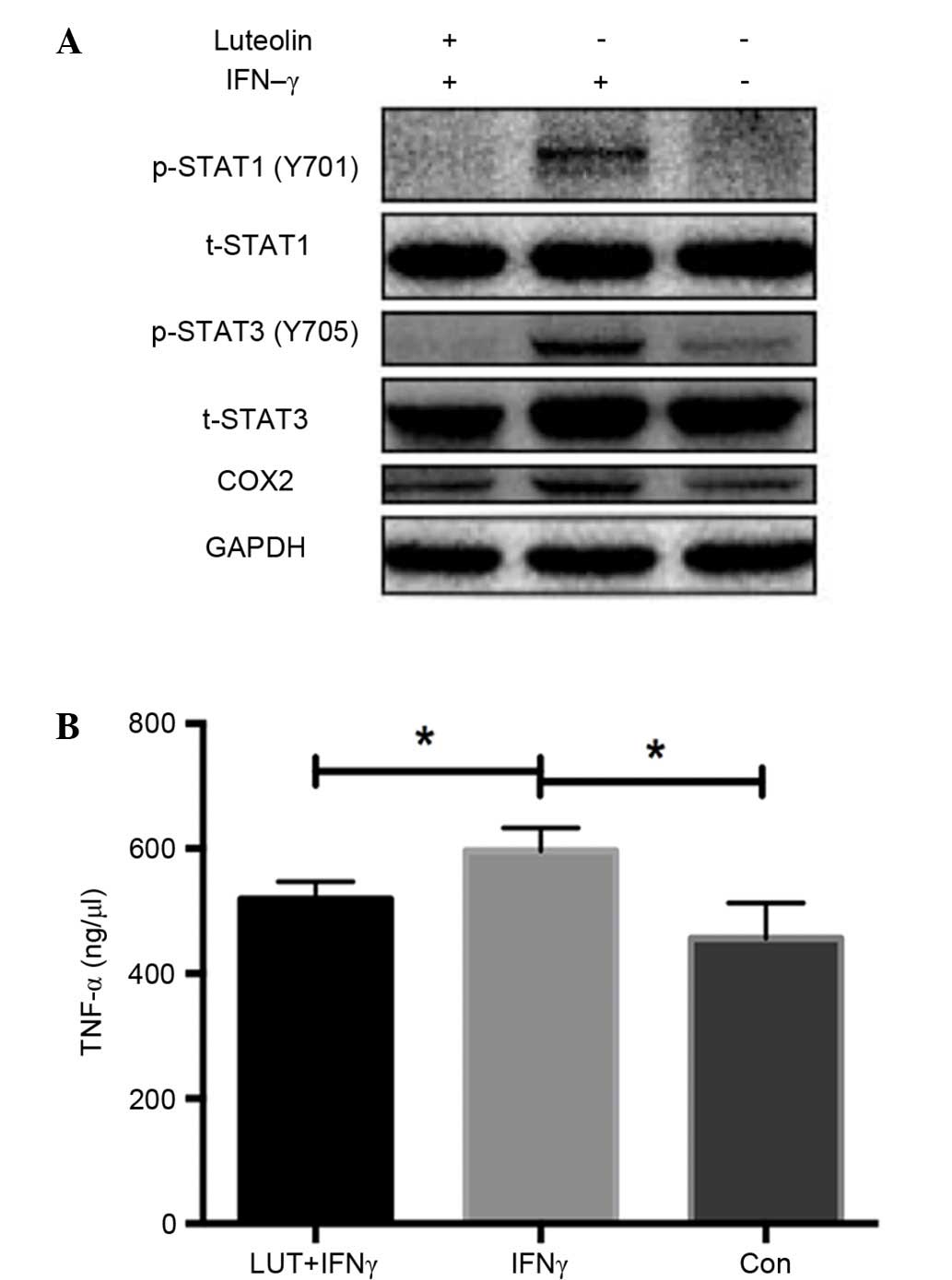|
1
|
McLeod DS and Cooper DS: The incidence and
prevalence of thyroid autoimmunity. Endocrine. 42:252–265. 2012.
View Article : Google Scholar : PubMed/NCBI
|
|
2
|
Vaidya B and Pearce SH: Management of
hypothyroidism in adults. BMJ. 337:a8012008. View Article : Google Scholar : PubMed/NCBI
|
|
3
|
Caturegli P, De Remigis A and Rose NR:
Hashimoto thyroiditis: Clinical and diagnostic criteria. Autoimmun
Rev. 13:391–397. 2014. View Article : Google Scholar : PubMed/NCBI
|
|
4
|
Chistiakov DA: Immunogenetics of
Hashimoto's thyroiditis. J Autoimmune Dis. 2:12005. View Article : Google Scholar : PubMed/NCBI
|
|
5
|
McLachlan SM and Rapoport B: Autoimmune
hypothyroidism: T cells caught in the act. Nat Med. 10:895–896.
2004. View Article : Google Scholar : PubMed/NCBI
|
|
6
|
Quaratino S, Badami E, Pang YY, Bartok I,
Dyson J, Kioussis D, Londei M and Maiuri L: Degenerate
self-reactive human T-cell receptor causes spontaneous autoimmune
disease in mice. Nat Med. 10:920–926. 2004. View Article : Google Scholar : PubMed/NCBI
|
|
7
|
Saitoh O and Nagayama Y: Regulation of
Graves' hyperthyroidism with naturally occurring CD4+ CD25+
regulatory T cells in a mouse model. Endocrinology. 147:2417–2422.
2006. View Article : Google Scholar : PubMed/NCBI
|
|
8
|
Nakano A, Watanabe M, Iida T, Kuroda S,
Matsuzuka F, Miyauchi A and Iwatani Y: Apoptosis-induced decrease
of intrathyroidal CD4+ CD25+ regulatory T cells in autoimmune
thyroid diseases. Thyroid. 17:25–31. 2007. View Article : Google Scholar : PubMed/NCBI
|
|
9
|
Wang SH and Baker JR: The role of
apoptosis in thyroid autoimmunity. Thyroid. 17:975–979. 2007.
View Article : Google Scholar : PubMed/NCBI
|
|
10
|
Shi Y, Wang H, Su Z, Chen J, Xue Y, Wang
S, Xue Y, He Z, Yang H, Zhou C, et al: Differentiation imbalance of
Th1/Th17 in peripheral blood mononuclear cells might contribute to
pathogenesis of Hashimoto's thyroiditis. Scand J Immunol.
72:250–255. 2010. View Article : Google Scholar : PubMed/NCBI
|
|
11
|
Li D, Cai W, Gu R, Zhang Y, Zhang H, Tang
K, Xu P, Katirai F, Shi W, Wang L, et al: Th17 cell plays a role in
the pathogenesis of Hashimoto's thyroiditis in patients. Clin
Immunol. 149:411–420. 2013. View Article : Google Scholar : PubMed/NCBI
|
|
12
|
Zhu C, Ma J, Liu Y, Tong J, Tian J, Chen
J, Tang X, Xu H, Lu L and Wang S: Increased frequency of follicular
helper T cells in patients with autoimmune thyroid disease. J Clin
Endocrinol Metab. 97:943–950. 2012. View Article : Google Scholar : PubMed/NCBI
|
|
13
|
Harris TJ, Grosso JF, Yen HR, Xin H,
Kortylewski M, Albesiano E, Hipkiss EL, Getnet D, Goldberg MV,
Maris CH, et al: Cutting edge: An in vivo requirement for STAT3
signaling in TH17 development and TH17-dependent autoimmunity. J
Immunol. 179:4313–4317. 2007. View Article : Google Scholar : PubMed/NCBI
|
|
14
|
Chaudhry A, Rudra D, Treuting P, Samstein
RM, Liang Y, Kas A and Rudensky AY: CD4+ regulatory T cells control
TH17 responses in a Stat3-dependent manner. Science. 326:986–991.
2009. View Article : Google Scholar : PubMed/NCBI
|
|
15
|
Durant L, Watford WT, Ramos HL, Laurence
A, Vahedi G, Wei L, Takahashi H, Sun HW, Kanno Y, Powrie F and
O'Shea JJ: Diverse targets of the transcription factor STAT3
contribute to T cell pathogenicity and homeostasis. Immunity.
32:605–615. 2010. View Article : Google Scholar : PubMed/NCBI
|
|
16
|
Kim HP, Son KH, Chang HW and Kang SS:
Anti-inflammatory plant flavonoids and cellular action mechanisms.
J Pharmacol Sci. 96:229–245. 2004. View Article : Google Scholar : PubMed/NCBI
|
|
17
|
López-Lázaro M: Distribution and
biological activities of the flavonoid luteolin. Mini Rev Med Chem.
9:31–59. 2009. View Article : Google Scholar : PubMed/NCBI
|
|
18
|
Xagorari A, Papapetropoulos A, Mauromatis
A, Economou M, Fotsis T and Roussos C: Luteolin inhibits an
endotoxin-stimulated phosphorylation cascade and proinflammatory
cytokine production in macrophages. J Pharmacol Exp Ther.
296:181–197. 2001.PubMed/NCBI
|
|
19
|
Kritas SK, Saggini A, Varvara G, Murmura
G, Caraffa A, Antinolfi P, Toniato E, Pantalone A, Neri G, Frydas
S, et al: Luteolin inhibits mast cell-mediated allergic
inflammation. J Biol Regul Homeost Agents. 27:955–959.
2013.PubMed/NCBI
|
|
20
|
Ziyan L, Yongmei Z, Nan Z, Ning T and
Baolin L: Evaluation of the anti-inflammatory activity of luteolin
in experimental animal models. Planta Med. 73:221–226. 2007.
View Article : Google Scholar : PubMed/NCBI
|
|
21
|
Selvendiran K, Koga H, Ueno T, Yoshida T,
Maeyama M, Torimura T, Yano H, Kojiro M and Sata M: Luteolin
promotes degradation in signal transducer and activator of
transcription 3 in human hepatoma cells: An implication for the
antitumor potential of flavonoids. Cancer Res. 66:4826–4834. 2006.
View Article : Google Scholar : PubMed/NCBI
|
|
22
|
Parker-Athill E, Luo D, Bailey A, Giunta
B, Tian J, Shytle RD, Murphy T, Legradi G and Tan J: Flavonoids, a
prenatal prophylaxis via targeting JAK2/STAT3 signaling to oppose
IL-6/MIA associated autism. J Neuroimmunol. 217:20–27. 2009.
View Article : Google Scholar : PubMed/NCBI
|
|
23
|
Rezai-Zadeh K, Ehrhart J, Bai Y, Sanberg
PR, Bickford P, Tan J and Shytle RD: Apigenin and luteolin modulate
microglial activation via inhibition of STAT1-induced CD40
expression. J Neuroinflammation. 5:412008. View Article : Google Scholar : PubMed/NCBI
|
|
24
|
Theoharides TC: Luteolin as a therapeutic
option for multiple sclerosis. J Neuroinflammation. 6:292009.
View Article : Google Scholar : PubMed/NCBI
|
|
25
|
Theoharides TC, Kempuraj D and Iliopoulou
BP: Mast cells, T cells and inhibition by luteolin: Implications
for the pathogenesis and treatment of multiple sclerosis. Adv Exp
Med Biol. 601:423–430. 2007. View Article : Google Scholar : PubMed/NCBI
|
|
26
|
Beeton C, Pennington MW, Wulff H, Singh S,
Nugent D, Crossley G, Khaytin I, Calabresi PA, Chen CY, Gutman GA
and Chandy KG: Targeting effector memory T cells with a selective
peptide inhibitor of Kv1. 3 channels for therapy of autoimmune
diseases. Mol Pharmacol. 67:1369–1381. 2005. View Article : Google Scholar : PubMed/NCBI
|
|
27
|
Takeda K, Kaisho T, Yoshida N, Takeda J,
Kishimoto T and Akira S: Stat3 activation is responsible for
IL-6-dependent T cell proliferation through preventing apoptosis:
Generation and characterization of T cell-specific Stat3-deficient
mice. J Immunol. 161:4652–4660. 1998.PubMed/NCBI
|
|
28
|
McLoughlin RM, Jenkins BJ, Grail D,
Williams AS, Fielding CA, Parker CR, Ernst M, Topley N and Jones
SA: IL-6 trans-signaling via STAT3 directs T cell infiltration in
acute inflammation. Proc Natl Acad Sci USA. 102:9589–9594. 2005.
View Article : Google Scholar : PubMed/NCBI
|
|
29
|
Zhou L, Ivanov II, Spolski R, Min R,
Shenderov K, Egawa T, Levy DE, Leonard WJ and Littman DR: IL-6
programs T(H)-17 cell differentiation by promoting sequential
engagement of the IL-21 and IL-23 pathways. Nat Immunol. 8:967–974.
2007. View
Article : Google Scholar : PubMed/NCBI
|
|
30
|
Kimura A and Kishimoto T: IL-6: Regulator
of Treg/Th17 balance. Eur J Immunol. 40:1830–1835. 2010. View Article : Google Scholar : PubMed/NCBI
|
|
31
|
Nishihara M, Ogura H, Ueda N, Tsuruoka M,
Kitabayashi C, Tsuji F, Aono H, Ishihara K, Huseby E, Betz UA, et
al: IL-6-gp130-STAT3 in T cells directs the development of IL-17+
Th with a minimum effect on that of Treg in the steady state. Int
Immunol. 19:695–702. 2007. View Article : Google Scholar : PubMed/NCBI
|
|
32
|
Xiao L, Muhali FS, Cai TT, Song RH, Hu R,
Shi XH, Jiang WJ, Li DF, He ST, Xu J and Zhang JA: Association of
single-nucleotide polymorphisms in the STAT3 gene with autoimmune
thyroid disease in Chinese individuals. Funct Integr Genomics.
13:455–461. 2013. View Article : Google Scholar : PubMed/NCBI
|
|
33
|
Kotkowska A, Sewerynek E, Domańska D,
Pastuszak-Lewandoska D and Brzeziańska E: Single nucleotide
polymorphisms in the STAT3 gene influence AITD susceptibility,
thyroid autoantibody levels and IL6 And IL17 secretion. Cell Mol
Biol Lett. 20:88–101. 2015. View Article : Google Scholar : PubMed/NCBI
|
|
34
|
Yan R, Yang J, Jiang P, Jin L, Ma J, Huang
R, Ma N and Jiang F: Genetic variations in the SOCS3 gene in
patients with Graves' ophthalmopathy. J Clin Pathol. 68:448–452.
2015. View Article : Google Scholar : PubMed/NCBI
|
|
35
|
Ajjan R and Weetman A: Cytokines in
thyroid autoimmunity. Autoimmunity. 36:351–359. 2003. View Article : Google Scholar : PubMed/NCBI
|
|
36
|
Park SJ, Nakagawa T, Kitamura H, Atsumi T,
Kamon H, Sawa S, Kamimura D, Ueda N, Iwakura Y, Ishihara K, et al:
IL-6 regulates in vivo dendritic cell differentiation through STAT3
activation. J Immunol. 173:3844–3854. 2004. View Article : Google Scholar : PubMed/NCBI
|
|
37
|
Weetman A, Bright-Thomas R and Freeman M:
Regulation of interleukin-6 release by human thyrocytes. J
Endocrinol. 127:357–361. 1990. View Article : Google Scholar : PubMed/NCBI
|
|
38
|
Kotanidou A, Xagorari A, Bagli E, Kitsanta
P, Fotsis T, Papapetropoulos A and Roussos C: Luteolin reduces
lipopolysaccharide-induced lethal toxicity and expression of
proinflammatory molecules in mice. Am J Respir Crit Care Med.
165:818–823. 2002. View Article : Google Scholar : PubMed/NCBI
|
|
39
|
Chen CY, Peng WH, Tsai KD and Hsu SL:
Luteolin suppresses inflammation-associated gene expression by
blocking NF-kappaB and AP-1 activation pathway in mouse alveolar
macrophages. Life Sci. 81:1602–1614. 2007. View Article : Google Scholar : PubMed/NCBI
|
|
40
|
Chen CC, Chow MP, Huang WC, Lin YC and
Chang YJ: Flavonoids inhibit tumor necrosis factor-alpha-induced
up-regulation of intercellular adhesion molecule-1 (ICAM-1) in
respiratory epithelial cells through activator protein-1 and
nuclear factor-kappaB: Structure-activity relationships. Mol
Pharmacol. 66:683–693. 2004.PubMed/NCBI
|
|
41
|
Jang S, Kelley KW and Johnson RW: Luteolin
reduces IL-6 production in microglia by inhibiting JNK
phosphorylation and activation of AP-1. Proc Natl Acad Sci USA.
105:7534–7539. 2008. View Article : Google Scholar : PubMed/NCBI
|
|
42
|
Hutfless S, Matos P, Talor MV, Caturegli P
and Rose NR: Significance of prediagnostic thyroid antibodies in
women with autoimmune thyroid disease. J Clin Endocrinol Metab.
96:E1466–E1471. 2011. View Article : Google Scholar : PubMed/NCBI
|
|
43
|
Maron R and Cohen IR: H-2K mutation
controls immune response phenotype of autoimmune thyroiditis.
Critical expression of mutant gene product in both thymus and
thyroid glands. J Exp Med. 152:1115–1120. 1980. View Article : Google Scholar : PubMed/NCBI
|
|
44
|
Einhorn J, Fagraeus A and Jonsson J:
Thyroid antibodies after 131I treatment for hyperthyroidism. J Clin
Endocrinol Metab. 25:1218–1224. 1965. View Article : Google Scholar : PubMed/NCBI
|
|
45
|
Crofford LJ: COX-1 and COX-2 tissue
expression: Implications and predictions. J Rheumatol Suppl.
49:15–19. 1997.PubMed/NCBI
|

















